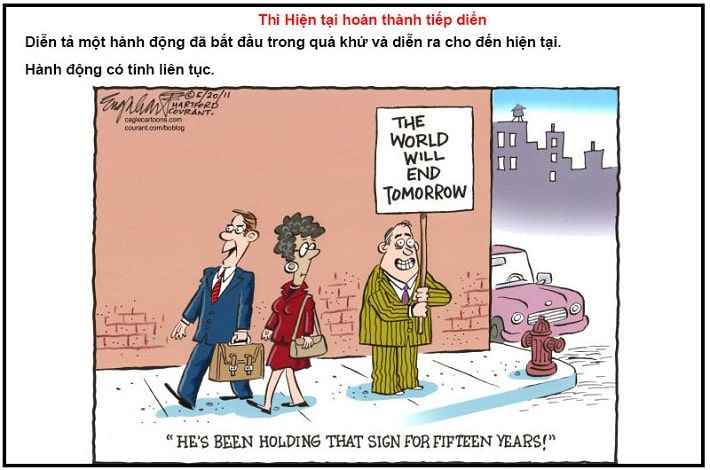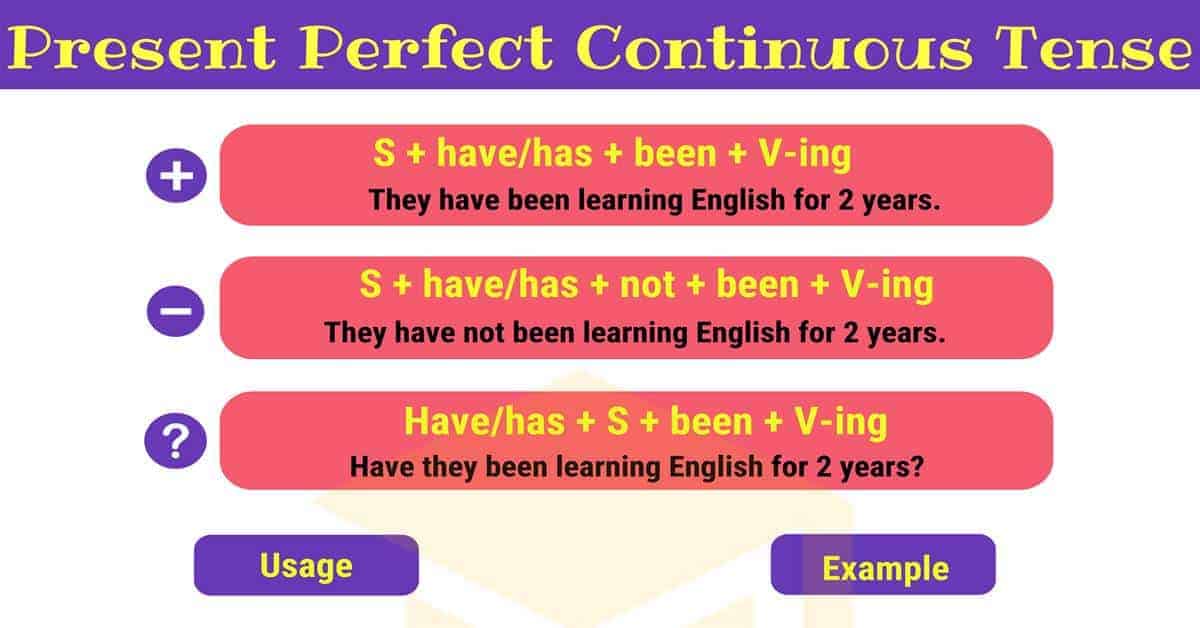Present perfect continuous tense
Join EnglishTopVN to immediately learn important knowledge about the PRESENT PERFECT CONTINUOUS tense with formulas, signs, and exercises with detailed answers. Besides, you need to practice the present perfect continuous tense to consolidate your knowledge for all tests.
1. Concepts
Present perfect continuous tense is used to refer to an event happened in the pastbut it still continues in the present and will probably continue in the future.This tense is often used to talk about events that have ended but we still see the impact on the present.

Examples of present perfect continuous tense
2. Formula

In there:
- S (subject): Subject
- Have/Has: Auxiliary verb
- Been: Participle II of "to be" (verb to be)
- V-ing: Verbs add "ing" ending
✎ NOTE:
- The subject is I/We/You/They we use "have".
- The subject is He/She/It we use "has".
2.1. Affirmations
S + have/has + been + V-ing
✎ NOTE: "been" always comes after "have" and has".
For example:
- I have been studying at this school for 3 years.
- She has been playing sports for a month.
2.2. Negative sentence
S + have/has + not + been + V-ing
✎ NOTE: For negative sentences, we just need to add "not" right after the auxiliary verb "have/has".
- haven't = have not
- hasn't = has not
For example:
- I haven't been playing basketball for 5 years.
- He hasn't been playing games with me for a year.
2.3. Question
Have/Has + S + been + V-ing ?
Reply:
- Yes, I/we/you/they + have.
- Yes, he/she/it + has.
- No, I/we/you/they + haven't.
- No, he/she/it + hasn't.
✎ NOTE:
- In interrogative sentences, we move the auxiliary verb "have/has" to the beginning of the sentence.
- Questions using "what, how, when, why,..." have the form: Wh-word + have/has + S + been + V-ing ? (For example: What have you been doing here for 2 hours? => What have you been doing here for 2 hours?)
For example:
- Have you been studying here for 1 hour yet?
- Has he been playing chess for a month?
3. How to use
➢ Expresses an action that started in the past and continues in the present and may continue in the future (emphasis on "continuous").
For example:
I've been working for 3 hours.
=> We can see that the starting time was 3 hours ago, which is in the past and is still ongoing.
➢ Describes an action that ended in the past but the result is still being mentioned in the present time.
For example:
Now I am very tired because I have been working hard for 8 hours.
=> We see that the action of "working hard for 8 hours" has ended and its result is "I'm very tired".
4. Signs of recognition
➢ The words often appear in sentence spresent perfect continuous tense to be: All day, all week, since, for, for a long time, in the past week, recently, lately, up until now, so far, almost every day this week, in recent years,…
As follows:
1. Since + timeline
For example:
- We have been working since early morning.
- I haven’t been eating properly since my mom left.
- My dad hasn’t been feeling well since 3 months ago.
2. For + period of time
For example:
- He has been listening to the radio for 6 hours.
- We have been being together for 10 years.
- They have been playing jazz for 8 hours.
3. All + thời gian (all the morning, all the afternoon, all day,…)
For example:
- He has been working in the field all the morning.
- My mom has been scolding me all day.
- I have been typing the report all the afternoon.

